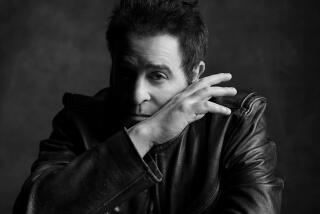In a Dark World, Music Lights Greg Drust’s Way
- Share via
SANTA BARBARA — He’s a walking encyclopedia on rhythm and blues, rock ‘n’ roll, country, blues, swing, jazz, gospel, folk, rockabilly, Cajun, you name it.
For 14 years he has been a mainstay at UC Santa Barbara’s campus station KCSB-FM, 91.9 on the dial, with a number of radio shows he produces, hosts and engineers.
His name is Greg Drust. He’s 33. And he is blind.
Drust lost his eyesight as a teen-ager. In the years since, he has built a career around his two lifelong interests in radio and music.
On the air Tuesdays, noon to 4:45 p.m., Drust interviews well-known and obscure artists and plays their records. He conducts interviews at the college radio station, at home or on the road in places like Nashville, New Orleans, New York and Chicago.
“Music is my whole life,” Drust said in an interview in a studio at his Santa Barbara home, where he tapes many of his shows. “I devote about 80 hours a week to music.”
His accomplishments are testimony to his energy. He has three syndicated radio shows airing over AM and FM stations in various parts of the country--one on blues, another on country and a third on polka.
He also is nationally recognized as a music historian. He writes record reviews and feature articles for music publications and Santa Barbara-area newspapers. He makes guest appearances from time to time on radio and TV shows from New York to Los Angeles and has written notes for numerous record albums.
“Music is a path toward truth and understanding,” he explained. “It deals with many social issues. It is bringing the world together. Music is one of the most uplifting things we have.”
Drust lost his sight 15 years ago in a head-on collision on a freeway when he was a freshman at UCSB.
“I thought my world had come to an end,” he recalled. “My face was smashed in, a real mess. I could not see, hear, smell, taste or talk for weeks. I got all those senses back except my vision.”
Drust’s passion for radio and music began in his youth in his hometown, Wauwatosa, Wis., a suburb of Milwaukee. “I played piano as a child and was a drummer in a combo my last two years in high school,” he said.
By the time he reached seventh grade he was a regular guest on a local country music radio show. In high school, he and three other students started a school radio station.
When Drust moved to California and enrolled at UCSB, he immediately joined the KCSB radio staff. It was during the second semester of his freshman year that the automobile accident occurred.
“It took about a year for me to learn Braille, to adjust to a life in total darkness before I returned to school and the campus radio station,” Drust said. He graduated in 1979 as the university’s top speech/communications student.
He has been at KCSB ever since, with stints at the same time on half a dozen other local AM and FM radio stations producing and hosting music shows.
“I would be doing the same thing if I wasn’t blind. The only difference is I would be further along in my career. It takes longer to produce a show without my eyesight.”
Drust earns enough money to make a modest living and pay for his travel. His handicap is rarely a problem on the road because he has friends in most cities he visits.
Three rooms in Drust’s home are filled floor to ceiling with shelves containing more than 35,000 out-of-print 45 and 78 records. The collection is so extensive that it is used by UCSB students, artists, music historians and others doing research.
Records are filed according to types of music: California blues, Chicago blues, Depression-era blues, harmonica blues, Louisiana blues, railroad blues, rural blues, women’s blues, and so on. Within each category they’re filed alphabetically by artists’ names. The jackets of his records are labeled in Braille.
Drust was co-founder and served as president of the prestigious Santa Barbara Blues Society. He is currently preparing a 10-show radio production of 1950s blues for Radio Berlin.
He produces his local shows and syndicated series through his company A+ Radio Productions. Drust said he is a workaholic totally immersed in what he is doing and loving every minute.
The way he sees his role in life “is to make sure people hear good music.”
More to Read
The biggest entertainment stories
Get our big stories about Hollywood, film, television, music, arts, culture and more right in your inbox as soon as they publish.
You may occasionally receive promotional content from the Los Angeles Times.










